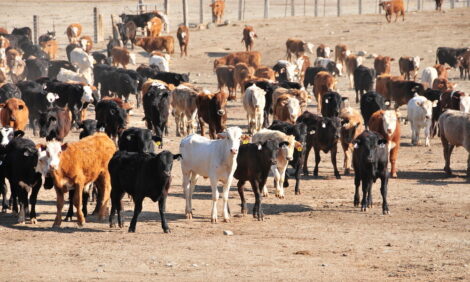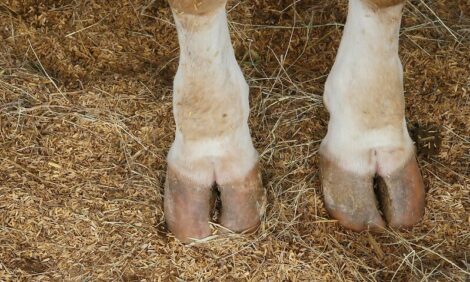



<i>E. coli</i> Vaccine Hits Mass Production
CANADA - A Canadian biopharmaceutical company has announced that it received $10 million in Ontario government financing in support of its E. coli O157:H7 vaccine production facility scale-up in Belleville, Ontario."With the support of our AMIS program, Bioniche will become the first company to bring innovation-driven animal vaccine expertise to Ontario," said Minister Pupatello who helped provide the loan. "Our government is helping to position Ontario as a leader in animal and food safety technology and expertise. This funding support is good news for the community of Belleville and for our province's agri-food sector."
|
E.coli
|
Bioniche has developed the world's first and only cattle vaccine that may be used as an on-farm intervention to reduce the amount of E. coli O157:H7 shed by cattle. This will be the first product manufactured in the scaled-up production facility in Belleville. The vaccine is unique in that it helps to reduce shedding of an organism that, while potentially lethal to humans, causes no disease in cattle. The Company obtained approval to distribute its vaccine under the Permit to Release Veterinary Biologics regulations by the Canadian Food Inspection Agency (CFIA) last December.
The Company plans to scale-up vaccine production at its Belleville facility over the next two years to provide capacity of 40 million doses of the E. coli O157:H7 vaccine. The scale-up is expected to cost approximately $25 million, and is part of a long-term, $100 million project to create an Animal Health and Food Safety Vaccine Manufacturing Centre. Financing for the remainder of the $25 million for the first phase of scale-up is in the process of being secured from other sources, the details of which will be announced when finalized.
"This provincial government funding represents the cornerstone of the financing we need to achieve our vision for a state-of-the-art vaccine manufacturing facility to produce not only our E. coli O157:H7 cattle vaccine, but other vaccines to reduce the likelihood of human illness from animal diseases," said Graeme McRae, President & CEO of Bioniche Life Sciences Inc. "The Ontario Ministry of Economic Development and Trade, through AMIS, has given a strong endorsement to our efforts to address serious human health threats that cause illness and death in thousands of people each and every year."
Approximately 100,000 cases of human infection with the E. coli O157:H7 bacteria are reported each year in North America. Health reports indicate that 2% to 7% of those people develop hemolytic uremic syndrome (HUS), a disease characterized by kidney failure. However, the percentage of HUS has risen to as much as 16% in recent outbreaks. Approximately five percent of HUS patients die, many of them children and senior citizens, whose kidneys are more sensitive to damage. Surviving persons may also be left with long-term impairment to the function of their kidneys and other organ systems.
The most serious case of E. coli O157:H7 water contamination in Canadian history occurred in Walkerton, Ontario, Canada (population: 5,000) in May, 2000. Walkerton is approximately 145 km west of Toronto. After heavy storms and flooding, E. coli contaminated run-off from farms entered the town water supply, where it was later discovered that purification systems/processes had broken down. Seven people died directly from E. coli, another 14 elderly people died of E. coli complications, and at least 2,300 people (more than 40% of the population at the time) became ill. One of the farms whose cattle were implicated in the contamination belongs to Dr. David Biesenthal, a veterinarian who was already adhering to the best herd management practices then available. Dr. Biesenthal is one of the first adopters of a vaccination program using the Bioniche E. coli O157:H7 cattle vaccine.
"I feel that this is another defense mechanism in reducing the likelihood of E. coli O157:H7 contaminating the environment," said Dr. Biesenthal. "It assists us in the agricultural community to demonstrate due diligence. I commend Bioniche and the Ontario government on their forward thinking."
Under the terms of the loan, the Company will receive reimbursement of 50% of its eligible expenditures to a maximum of $10 million. The loan is conditional upon the securing of certain other sources of financing which are currently being negotiated.
About the E. coli O157:H7 Cattle Vaccine
This vaccine received international recognition in September, 2007 by the Animal Pharm Industry Excellence Awards as the best new veterinary product for livestock. The vaccine has been developed by a strategic alliance formed in 2000 between the University of British Columbia (UBC), the Alberta Research Council (ARC), the University of Saskatchewan's Vaccine & Infectious Disease Organization (VIDO), and Bioniche, which holds the rights for worldwide commercialization of the vaccine.
The vaccine prevents the E. coli O157:H7 bacteria from attaching to the intestines of vaccinated cattle, thereby reducing their reproduction within the animal, and reducing the amount of bacteria that can be released through cattle manure in the environment. More than 30,000 cattle have been involved in clinical testing of the vaccine over the past five years.
Commercial usage of the vaccine began in September, 2007 with it being made available through veterinarian permit requests to the CFIA and Bioniche.
TheCattleSite News Desk


